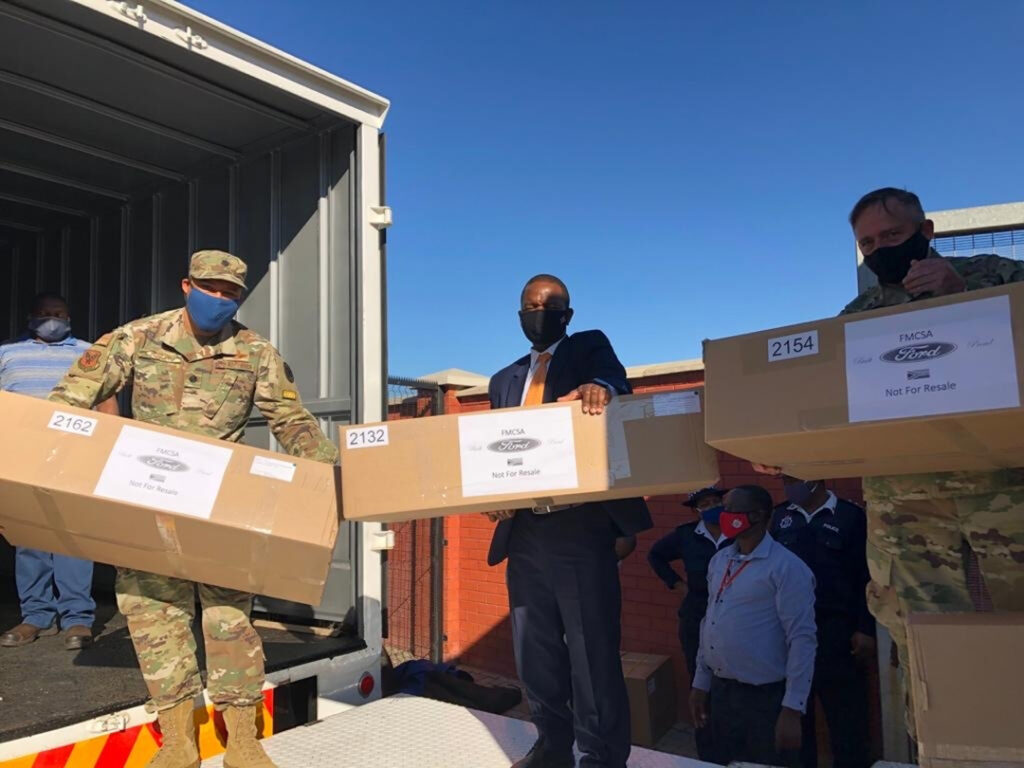ADF STAFF
The United States has donated 11,250 plastic face shields, 12,400 filtering facepiece masks and 256 infrared thermometers to the Eswatini Ministry of Health as the mountainous, landlocked Southern African nation grapples with the COVID-19 outbreak.
U.S. military personnel at the border with South Africa transferred the equipment into Eswatini. The U.S. Embassy also has dedicated 22 medical and technical experts from various agencies to strengthen Eswatini’s COVID-19 response.
Officially known as the Kingdom of Eswatini, the country of 1.2 million people has reported almost 600 confirmed cases of COVID-19, the disease caused by the novel coronavirus, and four deaths.
“We want to say, on behalf of his majesty’s government, thank you for this partnership between the Kingdom of Eswatini and the U.S.,” said Dr. Simon Zwane, principal secretary of Eswatini’s Ministry of Health, in a prepared statement. “We are so grateful to the American government for their generosity and warm-heartedness, which they have shown not only in this COVID-19 pandemic, but always.
“This will go a long way in assisting the kingdom to respond more effectively to this pandemic, particularly to our beloved front-line workers.”
The U.S. also is supporting 50 clinics and 1,926 facility and community-based support staffers during the pandemic.
As Eswatini’s largest donor, the U.S. also has given roughly $5.4 million in goods and services toward Eswatini’s COVID-19 fight.
That donation was used to equip hospitals, clinics and public health institutions; provide training, resources and protection equipment to front-line health workers; improve testing, surveillance and rapid-response capabilities; develop education material about ways to prevent the disease from spreading; and help deliver critical medications to patients during the pandemic.
Since 2004, the U.S. has invested more than $500 million in Eswatini health care infrastructure to combat the HIV/AIDS epidemic.
“Together, we are working to overcome the COVID-19 pandemic, to protect people who are most vulnerable to contracting this disease, and to preserve the advances Eswatini has made in the fight against HIV and AIDS,” U.S. Ambassador Lisa J. Peterson said.
The most recent U.S. donation of personal protective equipment came just before Eswatini saw a sharp rise in COVID-19 cases, which coincided with the easing of lockdown restrictions. Among those who tested positive was a member of Health Minister Lizzie Nkosi’s staff.
Nkosi said testing will intensify, and rapid response teams will be bolstered as more businesses reopen.
“We will have more health people out there,” Nkosi said. “I say this to encourage [residents] to remain calm but on high alert.”
The U.S. donations did not go unnoticed by Eswatini residents, many of whom work as farmers or as migrant workers in South Africa.
“Thanking in advance the helping hand always shared to us,” wrote a Twitter user named Mabisi.

